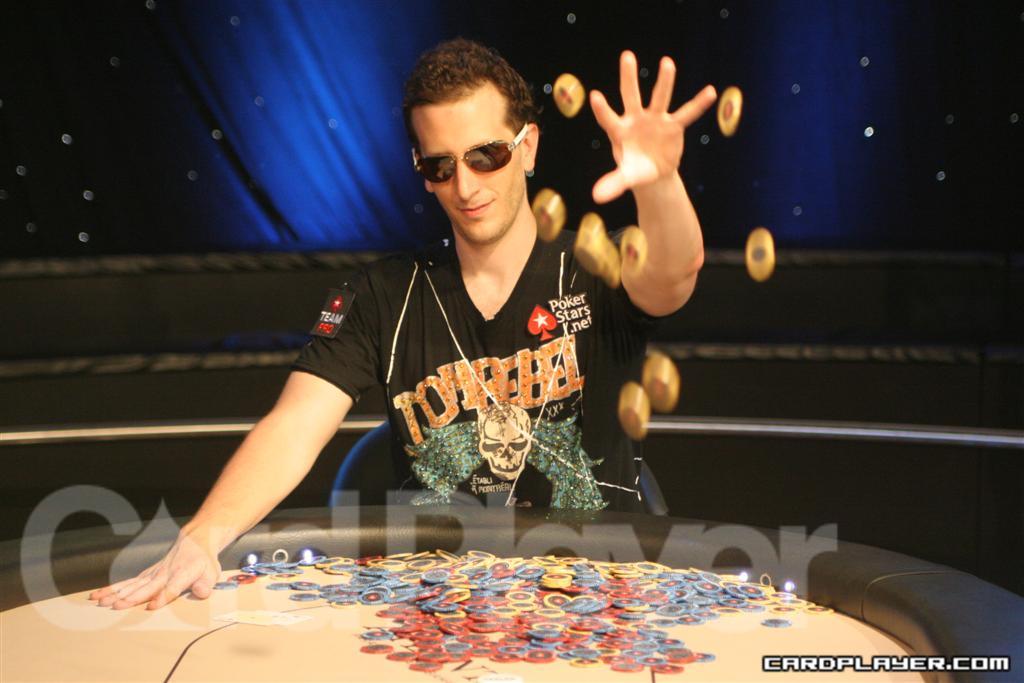Bertrand 'ElkY' Grospellier Talks About Upcoming Poker Stars SCOOPElkY Holds Many Records in WCOOP, and is Looking Forward to Spring Championship of Online Poker |
|
|

With the Spring Championship of Online Poker (SCOOP) set to kick off tomorrow on PokerStars, it seemed appropriate to pick the online poker legend's brain about his success in the WCOOP and what he's looking forward to about the SCOOP.
Shawn Patrick Green: You’re the most accomplished player in the WCOOP with four final tables and the most-ever cashes and tournament plays. What does it take to have so much success in the series?
Bertrand “ElkY” Grospellier: I love the WCOOP because the structure is more like that of live events. It’s deeper, and when it’s a deeper structure, you can have a bigger edge on the other players, I think. When everyone has only 20 big blinds, a lot of people already know general push-fold strategy. There aren’t too many big mistakes people can make when they have 20 big blinds. If they shove at the wrong time, they’re usually a 30 percent dog at worst, so it’s not that bad. But when you’re playing in a really deep tournament, sometimes you can put all of your chips in drawing completely dead.
I also like the WCOOP because the events last a long time. In the two-day event, you play for 12 hours on day 1, and some people get tired and make more mistakes at the end of the 12 hours. It’s a lot of the same skills that you need for live poker, because the structure is very good, and you play more hands because it’s online.
SPG: What strategies seem most important to consistently do well in online tournaments?
BG: For deep-structured events, I think small-ball strategy is usually the best. It depends on the table, but the softer the table is, the better it is to play small-ball strategy, because if players are smart or good, they can adapt to small-ball strategy, and if they know that you are going to play small ball all of the time, they can put you out of your comfort zone by making bigger raises and reraises to make your hands unplayable. But overall, the small-ball strategy is probably the best.

BG: I was playing a lot on the site, actually. When they picked me up, I had absolutely no live results, whatsoever, and I had very few online results. But I think that because I was a French player and they needed a French player on the team, and I was a bit famous in Korea, so those were two key points for PokerStars to pick me. Because I know some very good players in America, but it is much tougher for American players to be picked, since PokerStars already has so many, like Barry Greenstein, Greg Raymer, and all of these other people. I’m really glad that they picked me, because when they did, not many people knew who I was, and I didn’t have any results, but now I’ve done really well.
SPG: What do you do as part of Team PokerStars Pro, and what do they do for you in return?
BG: I have to play in some online events, like the online all-star week. I have to play those kinds of events online, and I have to advertise them, of course, as much as possible when I do interviews. They also set up some interviews for me, as well as photo shoots and some media stuff. But, basically, it’s nothing very hard or constraining, and they pay for all of my buy-ins, especially when they’re the event organizer. They book my rooms and they get my buy-ins, so it’s all very easy. Sometimes the registration queue is very long, and I can just go in as a pre-registered player and get my stuff, or a guy from PokerStars will find me and give me my seat assignment. But wherever I am for Team PokerStars, I’m with other Team PokerStars pros, so I can always talk about hands and strategies and stuff. So, it’s very good to be on Team PokerStars.
SPG: Are you planning on playing most events in the upcoming SCOOP?
BG: I’m not exactly sure. I’m playing in the bigger events, like the $10,000 buy-in event and the $25,000 heads-up event, and maybe the $3,000 two-day tournament, but at the same time I’ll be at Bellagio tournament series leading up to the $25,000 WPT Championship, so I’m not exactly sure. But I’ll play in them as much as I can.
SPG: What event are you most looking forward to in the SCOOP?
BG: I guess I’m really looking forward to the $25,000 heads-up tournament, because I’ve gotten so close to winning two times; I gotten fourth and third at the NBC National Heads-Up Poker Championship and second in the WCOOP, so I would really like to win one.
SPG: Your biggest WCOOP cash was for $320,000 for taking second in the $25,000 heads-up event. You also took down the high-roller’s event at this year’s PCA. It’s obvious that you don’t shy away from high buy-ins and stacked fields. Do you think your edge is much different in a tournament like that compared to a lower buy-in event?
BG: Well, of course it’s different, because the players are so good, but the edge is a bit less. But I think it’s a little bit helped by the fact that the structure is so deep, and the tournament lasts longer. You have so much more play. In $10,000 events, there are usually a lot of qualifiers who are not used to a deep-stacked structure. There are much fewer qualifiers in high-stakes events, but it’s really fun to play against all of these great players. You can adapt your game a lot because they all think on a different level, and it’s kind of easier to bluff them sometimes, because they give you more credit.
